- Home
- Nnedi Okorafor
Binti, The Complete Trilogy: Binti ; Home ; The Night Masquerade Page 7
Binti, The Complete Trilogy: Binti ; Home ; The Night Masquerade Read online
Page 7
I shut my eyes and tried to imagine I was with my sisters. Anything to drown out the sight of Heru and his always bursting chest. Over and over, warm blood spattering my face, no sound coming from him. His face frozen with shock. The stinger of one of Okwu’s people driven through his back . . . or was it the stinger of Okwu itself? I refused to ask. Never. But I wondered wondered wondered. The one Person on this university planet whom I had a connection with, who was the closest thing I had to family, family through war, may have killed the boy I had a crush on, killed Heru right before my eyes.
I grabbed my okuoko and squeezed, knowing I was smearing off some of the otjize I’d rolled them with. My okuoko had a firm yet almost gelatinous texture and it was still strange to me, but gradually I was getting used to them. As much as I could. They had sensation like any other part of my body, so grasping them was like grasping several long fingers. Shuddering, I let go.
I reached down and picked up a handful of the dry red soil and let it sift through my fingers. This planet wasn’t home, but it was a planet. A home. I pressed my palms flat to the ground. Immediately, I felt a little better. My heartbeat slowed, Heru and his shocked face retreated and I sighed.
“Hello? Are you alright?”
I looked up, shielding my eyes with one of my otjize-covered hands. I knew this girl, but I didn’t know her name. I still barely knew anyone’s name at my dorm. Since arriving six earth weeks ago, I’d hidden away from my schoolmates as much as I could. In the dining hall, I collected my food and took it to my room. I didn’t like dining halls.
“I’m fine,” I muttered, trying to get up. Then I remembered Heru’s parents and all my strength left me again. They’d called me yesterday. The holographic image of his mother had simply stared at me, stared so hard that I could practically feel her trying to sift through all that was me to find my memories of her son. She only wanted those glimmers of her son, not the surviving Himba girl to whom they belonged. Then she’d burst into tears, unable to say a word to me.
Heru’s father had shouted at me from behind her, “How does a beggar survive and my son not? What did you trade?! What filthy charms did you work?!” I thought they’d then break the connection, but they didn’t. They’d instead shouted and cried at me for over a half hour. I held my astrolabe, with a shaking hand, listening, gazing back at them into their eyes, quiet, from planets away. When they’d had enough, they finally broke the connection. The whole thing was horrible.
Whimpering, I pressed a hand to my face, wishing the girl whose name I didn’t know would leave me to grovel in the dirt alone.
“Don’t worry,” she said, squatting before me. “I’ll come down to you.”
My eyes flooded with tears that dropped into the soil at my sandaled feet and onto my long orange red skirt. Heru was dying again. The stinger in his chest. White. But his blood spread on it so easily. So red. I grunted, my heart was racing again.
She put a hand on my shoulder. “Breathe,” she whispered.
“Can’t.”
“You are, though,” she chuckled. “If you weren’t you’d have passed out by now.”
I blinked. I am alive, I thought. I just think I’m dead. I looked up at her smiling face. She had eyes green like leaves, skin the color of sand flower. She was dark for a Khoush, probably from spending so much time under Oomza’s suns. Even now she wore the blue jumpsuit I often saw her jogging about wearing. We both laughed.
“Breathe more,” she said, and I did. I felt stronger. The sight of Heru disappeared, for now. She helped me up and for a moment we stood there looking at each other. “My name’s Haifa. You’re Binti.”
“I have nothing to add to that,” I said.
“Everyone’s been wondering how you can be so together,” she said. “You save the university and everyone back home and then turn right around and start the semester without missing a step like some sort of superhero. Today, I think I’m finally convinced you’re actually normal and, well, mostly human.”
I burst out laughing. Oh yes, now I was breathing just fine.
“It’s nearly second sunset, best part of the day,” she said taking my hand. “Come sit and eat some mini apples with me. I’ve had a long day, too.”
“Okay.”
We walked across the dirt to the dorm path and I waited for the question: “Where’s your Okwu?” In these first weeks of registration, moving into my dorm, orientation, then classes, whenever I met anyone, this question was never far behind. I was so glad when Haifa didn’t ask it now.
We sat on the stone steps. Large and uneven, the fifty steps extended down about a half-mile to the first buildings of Math City. They were made for People with legs of various lengths. Nevertheless, the stone steps were tan and smooth and the sunlight warmed them, making them the perfect place for us to sit at this hour. We simply sat there eating sour mini apples, watching the second sunset. It was always a spectacular scene of orange-pink that softly glowed in the swelling darkness. With most classes having ended by this hour, there was no traffic on the steps.
“Why were you grabbing your hair like that?” she asked.
I shrugged. Then I just said it; I wasn’t home anymore. “They’re not hair.”
“Oh I know that,” she said, popping another mini apple into her mouth and rolling it about before biting. “Everyone does.”
“They do?”
She rolled her eyes. “Don’t you like them?”
I shrugged, “They’re mine.” I took an apple. I looked at it. Red and soft in flesh, the apples were delicious after you ate a few and your taste buds adjusted. “I was . . . I was having a moment. It’s been a lot.”
“I know,” she said. “What’s it been like? You’re part Meduse, now.”
I looked at her, but she seemed genuinely curious, an openness on her face that made it impossible for me to feel annoyed. “I’m . . . still getting used to it.”
“Of course you are. You don’t adjust to that kind of thing in a day.” She got up and did a graceful dancer’s twirl on one of the stones, her hands out. “Look at me,” she announced. “I’m fantastic.” She sat back down. “It’s not the same as your situation, but I was born physically male and when I was thirteen I transitioned to female.”
My eyebrows rose. “Oh,” I said. Back home, we called people like Haifa eanda oruzo, but they weren’t so open about it. And we didn’t say “transition”, we said “align” and once they align, it was never mentioned again. Amongst the Himba, you “were what you knew you were once you knew what you were and that was that”, to quote my village’s chief Kapika. I wondered if all the people of the Khoush communities were as open about alignment as Haifa.
“All my life, I knew this was who I’d be, but it still took some getting used to after I transitioned,” she said. “Well, more everyone around me, than me.”
“Did it hurt?” I asked.
“Did it hurt for you?”
“Well, yes . . . I mean . . . I . . . it was . . .”
“I’m joking, Binti,” she said, gazing at the sunset. “You got stabbed in the back with a Meduse stinger, that’s not going to feel good. And you didn’t even have a say in what happened to you. Doesn’t that bother you?”
I looked at my hands.
“No warning, no nothing, just ‘stab’, then you wake up and you’re part-Meduse. That’s really something,” she added, more to herself than me. Her words were making me nauseous and I focused on the deepening pink-orange sky. Haifa didn’t notice. “My goodness. Maybe we can’t really compare.”
“Maybe,” I said, my nausea passing. Still, Haifa had changed, too. And she’d been so clear in what she wanted that she’d done it voluntarily. I certainly would not have chosen to be stung by a Meduse, but would I have gone into that ship and risked everything if I had known what was about to happen? After a moment of thought, I knew I would have. I’d gone i
n there with the intent to live, but sure that I was going to die.
* * *
I can never forget the look on my mother’s face when I finally contacted home. I was sure everyone at home was livid with me, I couldn’t take it anymore. I’d grabbed my astrolabe and messaged home, not knowing who’d respond. Those moments of wait were agony. I’d grasped my edan so tightly that my hand ached. I considered treeing, but I didn’t think it was a good idea for my family after so many weeks to finally see me while I was up in the tree. Then there she was. As the hologram bloomed, I could initially see that she was standing in the kitchen. She was lit by a different sun than the one that would rise where I was in a few hours. She stared at me for a long time and I stared back, my eyes filling with tears.
“Binti.”
“Mama.”
It sounded like we said it at the same time but there probably was some sort of digital lag because of the distance.
“You made it.”
“I did.” I was weeping.
“Good.”
I told her everything. Every detail. Every fear. Every triumph. Everything except about what the sting had done. She listened and gasped with surprise and shock and laughed a few times and listened some more. She told me I was foolish and wise and that I owed her so much because I knew how much I’d hurt her, hurt everyone. Yet my mother still understood. And she reveled in the fact that I was her child. Papa had refused to speak with me this day. And that was like him. I told myself, maybe next time I reach out he’ll be the one to respond. I missed my family.
If I were surrounded by family, these first few weeks on Oomza Uni would have been better. I’d have still been tormented, but not so much. But I was there without any of them and the only family I had was often the source of my terror. During nights, I still relived my time on the ship over and over until all that I focused on was fear and . . . “What if Okwu . . . ?”.
This night, as I so often did, I eventually rolled over, picked up my edan from the shelf beside my bed and held it to my chest like a talisman. I stayed this way all night. I didn’t sleep.
* * *
At second morning, I had individual study with Professor Okpala. This would be our fourth session and I was looking forward to it, despite my lack of sleep. I went to see Okwu first as was my routine. It came out of its dorm as I walked up the path.
“Binti,” Okwu said. “You look tired.”
“I didn’t sleep well. I kept . . .” I looked directly at it. In the sunlight of the second sun, Okwu’s translucent blue dome shined like something underwater. “I kept thinking about the ship. And what your people did to everyone onboard except me and the pilot.” And the fact that maybe you yourself killed Heru, I thought.
“It was war,” Okwu said. “You should strengthen yourself with that knowledge. In war there’s death.”
I frowned at it, sensing that Okwu felt more than its words. Ever since I’d been stung and changed, it was this way. Okwu thought about what happened, too. It wondered. Things didn’t sit well for Okwu, even if it didn’t feel any guilt or terror over those Third Fish memories.
It began to move and I followed it. “Have you eaten?” it asked.
“I have. Have you?”
“I won’t until after class today. My mind is sharper when I want to eat.”
We were walking toward the shuttle station.
“Have you spoken with your mother, again?” Okwu asked. “You are better when you do.”
“I will,” I said.
“What of Heru’s brother? Has he left you alone?” It thrummed softly.
I looked at my feet. Heru’s younger brother Jabari had contacted me days after that terrible call from Heru’s parents. Talking to Jabari was even worse and still I had not disconnected. He’d demanded I recount every detail of his brother’s death, having not a care for my own feelings. “No,” I said glumly. “Not since that call.”
“That’s good,” it said. “Talking to him is useless.”
We stopped on the walkway and looked over the bridge. This walkway that ran over rushing waters that emptied into a strange sea some miles away was a favorite spot of ours. We came here every morning and we often met here. I inhaled the rush of wind that blew both my and Okwu’s okuoko. Okwu breathed out a burst of gas and I exhaled.
“Whoo!” Grinning, I spread my arms out as I faced the edge of the walkway that dropped down to the rushing water. “I’m awake now!” I exhaled and inhaled again, my eyes closed imagining myself leaping from the walkway toward the water, but then swooping over it as I then flew into the sky, up up into space. My good mood shifted a shade darker. I slowly turned to Okwu and said the first thing on my mind, “Sometimes, I hear you speak and your voice still sounds rough.”
After a moment, Okwu replied, “Sometimes I wonder why your voice sounds so smooth to me.”
“Oh,” I said. “Is that bad?”
“I prefer my language.”
I chuckled.
Okwu floated to the edge of the walkway and then hovered in the air over the edge, its okuoko dangling in midair. A strong breeze blew Okwu upward and then it slowly floated back to my level, still hovering over the drop. It returned to the walkway, its dome thrumming with pleasure.
We stayed there for a bit, standing side-by-side watching the water rush by. The air was so fresh; we both loved coming here. There was movement, but the area stayed the same and once in a while, there would be a procession of yellow fishlike creatures who were longer than the Root back home and slender like pipes. In the turquoise blue waters, you could see them perfectly wiggling like giant ribbons with large flat heads and big bulbous red eyes. I really loved them.
“Let’s go to class,” I said.
* * *
Okwu had a class in Math City so we walked together most of the way. We came to the building where its class was held and it was there that we parted ways. Professor Okpala’s office was only a few minutes’ walk away, at the center of Math City. I watched Okwu float off toward its building. Then I grasped the strap of my red leather satchel and pulled it closer to me. The straps and other parts of it were already caked with my otjize; no one would ever mistake my things for someone else’s. As I walked, I could feel my edan in the pocket of my long red skirt. “I am Binti Ekeopara Zuzu Dambu Kaipka of Namib,” I whispered to myself.
I walked along the wide street, staying close to the spiraling, coiling, hexagonal glass and cuticle buildings of Math City. A swift transport shuttle zipped through the center of the street, avoiding People who also moved in various ways down the middle of the street. On average, I was quite small compared to most of those around me and I was usually the only humanoid, let alone human. This was why I kept close to the buildings. Haifa had described human walking as “inefficient motion” and compared to almost everyone else, this was fairly accurate. Walking always seemed so slow and graceless compared to all the gliding, zipping, tumbling, creeping, flying, and porting.
Back home, the closest there was to even one of the streets in Math City was the weekend market where everyone was Himba and a few minutes’ walk away was open empty desert. As I walked, People stared at me, some talked about me in various languages I didn’t have to understand to understand. It wasn’t in my head. When I walked down the street, everyone noticed in some way.
“I am Binti Ekeopara Zuzu Dambu Kaipka of Namib,” I repeated to myself. But I refused to tree. No one was going to scare me into the tree. I scurried across the busy street, leaping around what looked like a Night Masquerade . . . at least this is what I heard they looked like. The Night Masquerade was a mythical creature in Himba culture that only men and boys could see.
“Hello, Himba hero Binti,” it said in Meduse, as it strode past me with its long stick-like body. Every move it made was accompanied by the sound of cracking and snapping.
“Greetings,” I said over my
shoulder. I giggled to myself, knowing there was no way it could be a Night Masquerade. I quickly moved on.
Math City was a grid of hexagons and Professor Okpala’s office was at its center in one of the five spiral towers. It was at the very top and I loved going up there. Her office had no walls, so the entire space was open to the elements. It didn’t rain much in Math City and the temperature for this time of the year hovered around ninety degrees and this was ideal for a desert girl like me.
This was my tenth session with Professor Okpala since I’d arrived at Oomza Uni. Thus far, all we’d really done were deep treeing exercises where I’d call up the exact current that I now understood activated the edan’s strange translation technology. It didn’t translate every language, but some of the ones that it did translate surprised me. I’d communicated with a bee-like insect hovering around a flower Okpala had brought in. The insect had been obsessed with the deep orange hue of the flower and the work it planned to do with others of its kind. And it hadn’t been interested in talking to me, so it didn’t respond to anything I said to it except to tell me, “Go away, I’m busy”.
Okpala had later introduced me to one of her graduate students, an Okwu-like Person. It had been angry when it realized I could understand the insults it spoke about me to Professor Okpala. It had been jealous of my closeness to the Meduse and didn’t think I deserved the honor, no matter what I’d done to earn it.
“Sit down,” Okpala said when I stepped out of the elevator. “You’ll need all your strength today . . . if you do this right.” The astrolabe she wore clipped to her hip vibrated. “Relax yourself for a few minutes while I talk to this student,” she said stepping away.

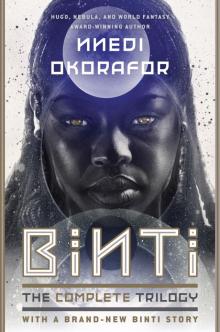 Binti, The Complete Trilogy: Binti ; Home ; The Night Masquerade
Binti, The Complete Trilogy: Binti ; Home ; The Night Masquerade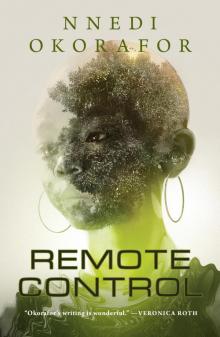 Remote Control
Remote Control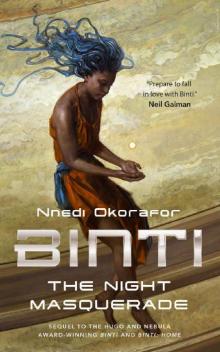 Binti: The Night Masquerade
Binti: The Night Masquerade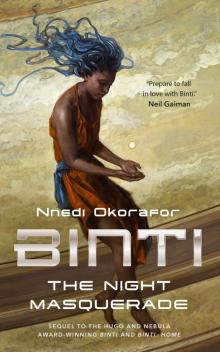 Binti--The Night Masquerade
Binti--The Night Masquerade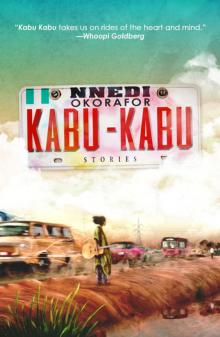 Kabu Kabu
Kabu Kabu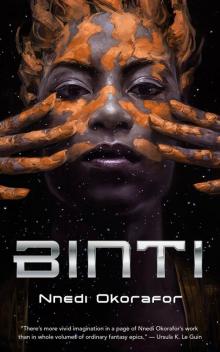 Binti
Binti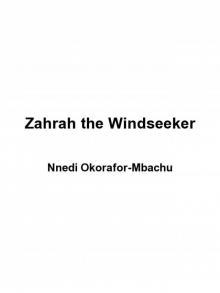 Zahrah the Windseeker
Zahrah the Windseeker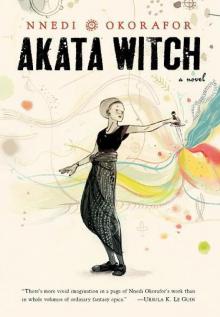 Akata Witch: A Novel
Akata Witch: A Novel Ikenga
Ikenga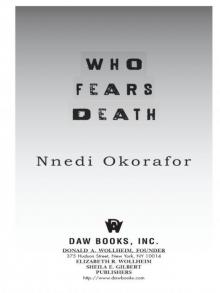 Who Fears Death
Who Fears Death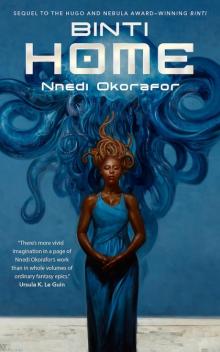 Binti--Home
Binti--Home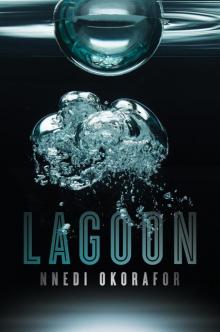 Lagoon
Lagoon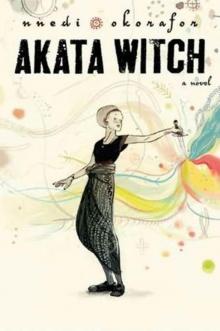 Akata Witch
Akata Witch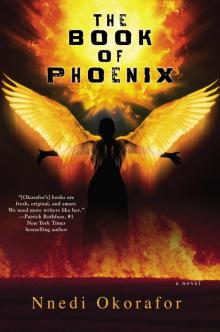 The Book of Phoenix
The Book of Phoenix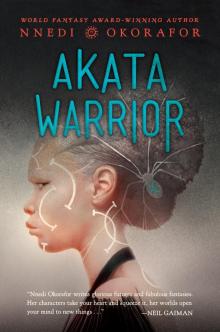 Akata Warrior
Akata Warrior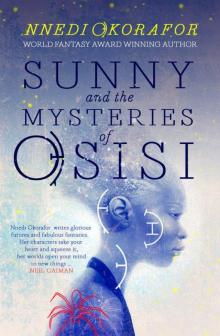 Sunny and the Mysteries of Osisi
Sunny and the Mysteries of Osisi